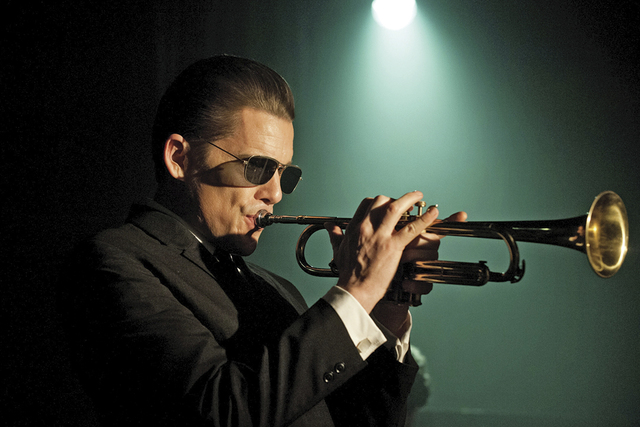The first shot of Born to Be Blue is a close-up of a trumpet, laid on the dirty floor of what turns out to be a ratty jail cell. The notorious jazz musician Chet Baker is in the clink, presumably for one drug offense or another. He’s on the dirty floor, too. Baker’s horn sits there, gaping at him. He can never fill its maw, never plug up the emptiness, never satisfy his various cravings. Just then a big black spider crawls out of the trumpet’s bell.
Hmm. Maybe Baker has the DTs, or maybe the film is telling us not to take everything here literally. Writer/director Robert Budreau underscores his approach with the next sequence: Baker (played by Ethan Hawke) has been rescued from his lockup and plunked into a Hollywood film project of his own life. While shooting a scene of rampant substance abuse, the other actor complains that it doesn’t seem real, and Baker blithely makes the case for improvising around the facts: “If this were real, there would be vomit everywhere.” I guess we’ve been warned: What follows in Born to Be Blue is a heavily fictionalized story of a real person. It’s a jazz movie, in the sense that Budreau and Hawke are vamping around a central theme. This will upset purists, but I think the film is onto something interesting.
The time is the late 1960s, as Baker embarks on a relationship with an actress (the reliably terrific Carmen Ejogo, from Selma) and tries to stay off drugs for a while. It includes the terrible real-life beating that knocks Baker’s teeth out, forcing him to relearn how to play trumpet. That suggests a triumph-over-adversity storyline, and yes, the movie follows that along for a while. But we’re never far from Baker’s childlike, irresponsible self, and there is no way a Chet Baker movie can end happily.
Born to Be Blue has problems. It lurches around early on, and uses clumsy voice-over comments to fill us in on information otherwise left out. Music-biopic clichés intrude, with Baker’s rivalry with Miles Davis front and center. Also, there’s a scene of Baker sitting in his bathtub playing trumpet. You can clean a horn in a tub, but I sense the tradition of musicians playing trumpet in bathtubs is strictly a movie thing.
Despite the clumsiness, the film casts a spell. Its jazz rhythm has something to do with this, but a lot of it comes from the casting of the central character. Ethan Hawke entered movies as a teenager, and a few too many of his early roles consisted mostly of callowness and hips-forward swagger. As his aging through Richard Linklater’s Before trilogy demonstrated, Hawke has done a lot to dissipate his pretty-boy looks. In recent years, there’s been a real richness to his work, culminating in his touchingly lived-in performance as the dad in Boyhood. In Born to Be Blue, Hawke hits all the notes—he mimes the trumpet convincingly, but, more important, he taps an untethered lostness that does more to explain the beautiful catastrophe of Chet Baker than all the words in the screenplay. The look on Hawke’s face as he tries to clarify why he uses heroin—“It makes me happy”—is a newborn animal blinking into the light for the first time, a junkie’s bliss at remembering a past high. It’s without judgment, and refreshingly honest.
Undoubtedly the real Baker had more monster in him (recall Bruce Weber’s Let’s Get Lost for the documentary version—though still romanticized—of Baker’s wreckage). But Born to Be Blue is more interested in trying to get to the great conundrum of this kind of artist: How could someone so messed up create something so gorgeous? “I just want to play,” says this movie’s exhausted Baker, as though to fend off such a heavy question. We should take this statement literally—the heroin doesn’t make his music better, it’s just a way to get everything else out of the picture, so that nothing gets between Chet Baker and playing. The movie allows these different things to be true at the same time, as the ugliness of Baker’s life exists alongside the sweetness of his music. The film, and Ethan Hawke’s committed performance, makes that observation an act of empathy. E
film@seattleweekly.com
Sundance Cinemas
4500 Ninth Ave. N.E., sundancecinemas.com. Rated R. Opens April 8.






